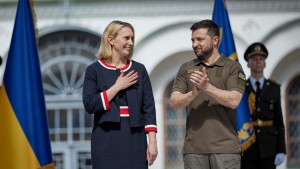This interview was originally published in 2020 as part of a series profiling Kenyon women to celebrate 50 years of coeducation at Kenyon.
A political science major at Kenyon, Ambassador Bridget Brink also holds master’s degrees from the London School of Economics. Since joining the State Department in 1996, she has focused on advancing U.S. policy in Europe and Eurasia. She was nominated by President Biden to be U.S. Ambassador to Ukraine on April 25, 2022, confirmed unanimously by the U.S. Senate on May 18, 2022, and arrived in Kyiv on May 29, 2022. A career member of the Senior Foreign Service, Brink served as U.S. Ambassador to the Slovak Republic from August 15, 2019, until her confirmation as Ambassador to Ukraine.
How do you prioritize your life and get things done?
In addition to being a professional diplomat, I am also married with two kids and two dogs. Prioritizing my life is a constant challenge! My job requires me to change countries, colleagues and issues every few years. It’s a lot of fun, but also requires being organized, flexible and strategic in order to focus on the priority issues. Time is my most precious resource. It is easy to be distracted by someone else’s agenda, especially in the era of social media. One of the best pieces of advice I have heard is to keep focused on your goal — personal or professional — and then allocate your time and resources toward that goal.
Where did you first discover your power?
I think the key in any profession is that you have to be yourself and play to your strengths. Early in my career, when almost all my colleagues in my area of expertise were men, I did everything I could to “blend in” and be like everyone else. Later, as I started to take on positions of leadership, I found that I was more successful as a leader when I led with my own style — so I think I found my power when I felt comfortable in my own skin.
Who at Kenyon inspired you?
So many people! Of course my professors: [former visiting instructor] Peter Ahrensdorf, who was my first political science professor, inspired a love for the great questions like “What is justice?”; Professors Harry Clor and Fred Baumann deepened this love with their challenging classes. I also loved the late Professor [of History] Roy Wortman’s class on Native American history. [Associate Professor of Philosophy] Juan De Pascuale was inspirational in his passion and energy for the great thinkers.
But one of the enduring legacies of my time at Kenyon is also my wonderful friends and classmates. I think back fondly of the time discussing big ideas in the Kenyon Bookstore, studying in Ascension Hall or just hanging out in the dining hall. These are people who are important in my life even today
What’s the best advice you’ve ever received?
Failure is just a rest stop on the path to success.
How has your worldview evolved since leaving Kenyon?
I like to say that my life as a professional diplomat started in a small, rural liberal arts school in Ohio. Kenyon supported my junior year abroad in Europe, which led to my return there for graduate school, my meeting my future spouse and my decision to join the U.S. Foreign Service. Needless to say, my worldview changed considerably during and after my time at Kenyon.
I am from Grand Rapids, Michigan, and the opportunity to spend four years exploring new ideas, things and places changed my life and perception of the world forever. It is smaller than I ever realized. People all over the world generally want the same things: the chance to follow their dreams, an equal and fair opportunity for their children, and a government that provides basic services. And, with the advance of technology, we are both more and less connected than ever.
This interview has been edited for length and clarity.
